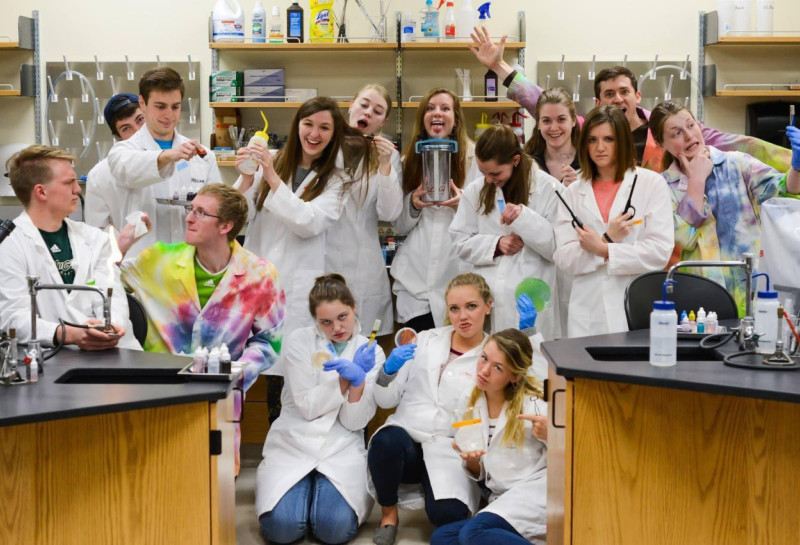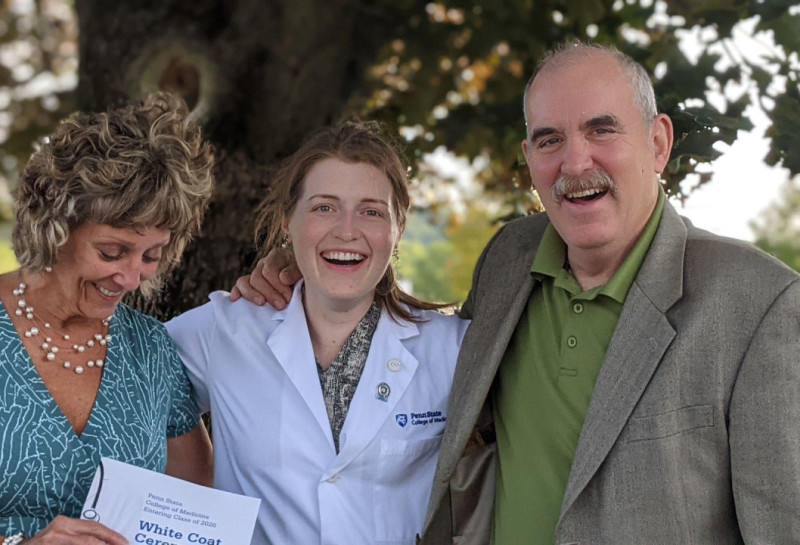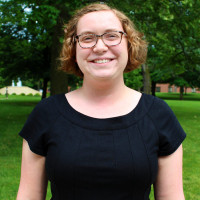In Her Own Words: Jeniece Regan
In our current “In Her Own Words” series, Forester women who are making a difference in the world as advanced healthcare professionals are sharing their stories. Less than 10 years after they earned their bachelor’s degrees from Huntington University, these women have already traveled unique paths to careers in healthcare practice. They have become dentists, physical therapists, physician assistants, medical doctors, and more — and this is only the beginning.
The story that follows comes from an interview with one such Forester.
Jeniece Regan (2018)
Medical Research
Jeniece Regan is partway through the MD/PhD program at the Pennsylvania State University in Hershey, Pennsylvania (“You can smell the chocolate and the roasting peanuts,” she says). Regan is on track to graduate with an MD and a PhD at the same time. As of 2023, she is in the research portion of her program, working toward defending her PhD thesis.
Why choose an MD/PhD program?
It fits what I want to do with research. When I started at HU, I started going down the pre-med track because I wanted to be a physician. I had read a lot of physician biographies as a kid, so that was what interested me in medicine. But it wasn’t until I was sitting in my chemistry class and Dr. Nalliah was telling us, “You can get an MD and a PhD at the same time, and not only that — they’ll pay your way” I thought, “This is interesting. I’ve never heard about this.” I started my sophomore year trying to gear my path towards that, knowing I’d have to take two years to do research and submit an application.
It makes sense if you’re doing a research career. It doesn’t make sense if you’re going straight into medicine, because you’re giving up four years of that pay to get a second degree.
After HU
I spent two years at the NIH [the National Institutes of Health]. I did research, mainly [on] fatigue in cancer patients, particularly across the cancer cohort. We wanted to figure out why some people report having significant fatigue, if there’s any biological basis for that — we did find some. It was a wonderful opportunity. I got to do both clinical work and science work and get exposed to what government research is.
How does the MD/PhD program work?
What’s most common is the first two years you will do your basic science coursework with your regular MD classmates who have entered in the same year you have entered. [Then] your regular MD classmates would go on to do clinicals for their third year and their fourth year apply for residency. That’s the point when I diverge from their path. I’ll take the first of my licensing exams and then I’ll go into [the] lab and do about a year of PhD coursework before I’m in the lab full time and don’t have any classes and can run all of my experiments without having to worry about class times. And at the end I’ll defend my PhD. Some programs will give you the PhD then; my program, I’ll get it once I graduate with my MD. I will go back to do my clinicals and apply for my residency.
How does “they’ll pay your way,” the perk Dr. Ruth Nalliah mentioned, work?
It’s different with different places. Some places don’t (within the MD/PhD) pay, or they’ll pay part of it. When I entered my position, it was partially funded by the NIH, so I get paid a stipend every year to live on and then my med school is covered. Graduate school — which usually for sciences is covered at the PhD level — will be paid for completely, so I’ll graduate debt-free from my graduate school and medical school.
What area of research are you focused on?
I’m doing neuroscience. We’re looking at genome-wide association studies, when they look at your genome to figure out what variants you have there that are associated with a disease. My project looks at that in light of Alzheimer’s contexts to figure out what genetic variants might make people more prone to Alzheimer’s disease. What I’ll be doing is screening variants that we find in a cellular model to provide a cellular context, because not all “variants” that we find are true variants. So we have to start screening them. That’s what I’ll be doing, and then analyzing them further. “Studying Alzheimer’s disease” is the short answer.
What are you the proudest of so far?
Being able to get into a program. It’s hard doing that, and being able to stick with it — even when it was hard during clinicals. You have a lot of information…the “fire hose” is quite real.
There are more stories to tell!
Check out the Spring/Summer 2023 edition of the Huntington University Magazine for the start of this series, and come back to the HU blog for new interviews.
If you know a Forester woman doing awesome things in healthcare who should be included in this series, tell us about her at huntington.edu/ForesterFlashback.



